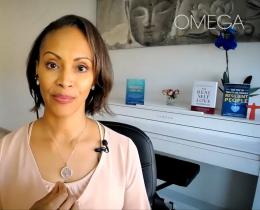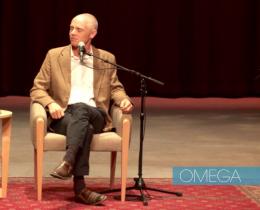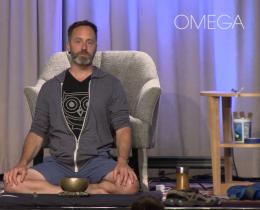Friday Evening: From Anxiety to Relaxation
I was uncomfortable. How could I take a weekend away from my family and a yard full of chores to indulge in a workshop entitled Uncork Your Creative Juices: Appreciating Wine, Music, Chocolate & Poetry? There are political phone calls to make, emails to send, support to gather for people suffering from Hurricane Florence and around the world.
These are some of the thoughts that swirled as I pulled into a parking spot at Omega on a beautiful fall day. But I am warmly welcomed by a staff that provides me with keys to my cabin and tells me everything I need to know about my time on campus—including open yoga and meditation sessions, performances, and more—and I begin to relax.
After dinner in the dining room with a woman who is attending a Reiki workshop, I am ready to lean into our first session with Michael Gelb, a creativity, innovation, and leadership coach who has worked with some of the planet’s most successful organizations. He is also an author whose best-known book, How to Think Like Leonardo da Vinci, has been translated into 24 languages and sold more than 600,000 copies worldwide since it was published 20 years ago.
The Birch classroom up the hill by the dorms easily holds our group of eight—from a couple in their 70s to a 30-something woman attending with her mother. We choose seats in a horseshoe shape around Michael, who has set up an easel with a large notepad, candles, a vase of flowers and, on a side table, a bottle of wine and a couple of chocolate bars. This looks promising. I am eager to know how increasing my ability to discern the finer things will apply to the ordinary complications of my own life—work, family, friends, politics, and other things that matter.
He begins by describing our upcoming time together as an antidote to “Dionysian malnutrition.” It’s the result of a culture, he explains, that confuses quality with quantity, bigger with better. “We will,” he says, “aim for optimal fun as we explore the art of enjoyment.”
Michael then pours us each a generous taste of a 2015 Pinot Noir from the Central Otago region of New Zealand, and as he walks us through Wine 101—demonstrating how to swirl the wine in the glass, inhale the aroma for a complete sensory experience, and take our first full mouth taste—he cuts to the gist of why we’re there. Our task is to let go of judgment, replacing our habitual binary response of “Do I like it or not?” with “What’s my experience?” and “What do I notice, not just on first impression, but after the second or third impressions?”
He has my attention, along with the others in the room who want to know more about what separates a good wine from a great wine and, why, in the scheme of things, does it really matter?
“None of this is significant outside of the enjoyment you’re experiencing and the pleasure you can bring to other people,” Michael says. “What matters is creating happiness through inspiring experiences.”
He breaks apart two different chocolate bars, passing the pieces around for us to sample, savor, and compare. We apply our next lesson in discernment by coming up with an array of adjectives to describe what we’re tasting, and, a short time later, bid each other good night.
Saturday: The Love of Wine & the Love of People Go Together
When we meet again, Michael illustrates his ideas with stories from his travels, his work with his clients through food, wine, and poetry, and qigong. The group is clearly at ease, curious, and ready for some fun, and Michael is happy to let our questions guide the conversation. It seems that what most of us want to know more about is—wine.
“The love of wine and the love of people go together,” he explains. “When you are drinking and when you are talking about what you are drinking, you can be fully present with your experience.”
Talk is, in fact, an essential component of appreciation. The colorful descriptions of wine and chocolate that we each played with last night were not an exploration of accuracy, but rather, conversation starters. We are learning that listening to someone describe their experiences can help expand our own perceptions and draw us away from often reflexive responses of either-or, right-or-wrong.
“Our brains like comparisons,” Michael explains. “Don’t just stop at what you like, but delve deeply into your impressions. We recall distinctions more easily when we have contrast.”
The afternoon includes another level of sensory immersion when we are joined by Michael’s wife, Deborah Domanski, a coloratura soprano who leads us into an experience of listening. From scratchy recordings of Nellie Melba, an early 20th-century vocalist, to Joan Sutherland and Cecilia Bartoli, we tune into our own preferences and stretch our ability to share them. Then Deborah’s impromptu performance of Ave Maria stuns our increasingly garrulous group into appreciative silence. A little later, with often-sequestered parts of my brain newly awake, I realize that I’m able to see more—and more vividly—as I stroll in the woods around campus.
Saturday Night: Glimpsing Each Others Hearts & Souls
The program brochure described Saturday night’s event as a “special dinner from Omega Foodworks,” but no one anticipated the transformation of the all-purpose classroom into a private dining room, elegantly outfitted with tablecloths and flowers. With each new hors d’oeuvre that is passed, the group experience escalates from curiosity and appreciation to delight and joy; from the mushroom risotto to the flourless chocolate cake and poached pears, we sink into delectable communion. Primed by gustatory pleasure, we read aloud poems that we’ve each selected to share, listening to our dining companions with rapt attention, knowing we are glimpsing each other’s hearts and souls.
Sunday Morning: Discovering Poetry Within
At our final session, Michael demonstrates qigong exercises to further open us to higher levels of consciousness and help us find balance. We also read poems we each wrote the previous night. Never a poet, my pen slid across the paper, helped, perhaps, by the wine tastings that accompanied our feast. But it may also have been an increased ability to discern nuance, a more finely attuned awareness that I can only hope to bring with me as I return to the daily complexities of life.
A Parting Poem
Uncorking
by Betty A. Marton
An intimate group of strangers joined
By common curiosity eager
To uncover the complexities
Of a pinot noir or the person to the left.
Dulled palettes rejoice
Minds ripen with wisdom
From a bottle
Beckoning joy made more delicious
By tears riding on the words of a poet.



